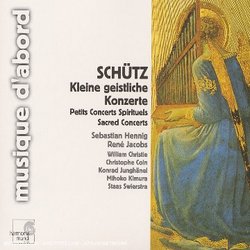| All Artists: Heinrich Schutz, René Jacobs, William Christie, Sebastian Hennig Title: Schütz: Kleine geistliche Konzerte Members Wishing: 0 Total Copies: 0 Label: Harmonia Mundi Fr. Original Release Date: 1/1/2006 Re-Release Date: 7/11/2006 Album Type: Import Genre: Classical Styles: Opera & Classical Vocal, Historical Periods, Baroque (c.1600-1750) Number of Discs: 1 SwapaCD Credits: 1 UPC: 794881801626 |
Search - Heinrich Schutz, René Jacobs, William Christie :: Schütz: Kleine geistliche Konzerte
 | Heinrich Schutz, René Jacobs, William Christie Schütz: Kleine geistliche Konzerte Genre: Classical
|
Larger Image |
CD Details |
CD ReviewsA voice teacher and early music fan George Peabody | Planet Earth | 04/22/2007 (4 out of 5 stars) "SEBASTIAN SAVES THE DAY! The 'Kleine geistliche Konzerte'and 'Symphonie sacrae'(selections from both are on this disc) contain an assortment of styles and many individual pieces that change style from one section to another, but the different style characteristics remain separately discernible to the listener. In the concertatos on this recording Schutz has employed all the devices known by contemporary Italian composers. They are: dissonance, abrupt changes of tone centre, chromaticism, echo effect, and secco recitative. Moreover, the phrasing moves with the inflections and rhythm of the spoken language, which is usually German. This recording is a reconstruction as 'authentic' as possible, for it is the blend of the mature and well-schooled male alto voice, with the clear crystalline and 'natural' sound of the 'childish' boy soprano,'that Schutz heard in his mind and which was artistically so pleasing to him'. Some of these pieces are soprano solos, some are alto solos and some duets, all capably accompanied by 4 instruments: organ-violoncelle-archiluth and violons. The instrumental sound is always appropriately under the voices, and do not play 'out' except on instrumental solos, which are not all that frequent. There is no doubt that the lead singer is the boy soprano: Sebastian Hennig, who is nigh unto amazing! His upper notes are pure 'gold' and his tone quality very even throughout his entire range. A joy to hear him! I am very familiar with Rene Jacob's alto voice, and he is quite skilled in everything he does, but I wish that he would remain a conductor for his voice actually annoys me after about 10 minutes of his singing. However, he is considered to be an excellent male alto, and therefore I'm probably the only one in the world that doesn't like it. Positively speaking he is very good at blending with the soprano and does not oversing at any time. In fact, I prefer his duets on this disc to his solos. Five of my favorites from this album are: 'Wie ein Rubin in feinem Golde' (As a ruby gleams in fine gold)-'O Susser, o freundlicher' (O sweet, O kind)-"Bone Jesu" (O kind Jesus)-'Bringt her dem Herrn' (Give Unto the Lord)-'Herzlich lieb hab ich dich o Herr' (I will love thee O LOrd, My strength). This 1982 album in neatly packaged and includes an informative booklet describing the music and includes the text. Languages are French, English and German. The American Record Guide: "Over the years there have been many fine recordings of these sacred miniatures by Schutz...but this is by far one of the most satisfying, as well as perhaps most authentic we have yet had."" Whoa! Is This the Same Schuetz? Giordano Bruno | Wherever I am, I am. | 12/31/2008 (5 out of 5 stars) "Yes, of course it is, the great Heinrich Schütz who is often credited with teaching all northern Europe the styles and techniques of baroque Italy. But this performance is unlike any other recording of the "Little Sacred Concerts" or the "Sacred Symphonies." If Schütz had fallen into the hands of the Counter-Reformation during his second visit to Italy, and composed his 'seconda prattica' concerts for use in the rarified ambience of Carissimi's Rome, the music might well have sounded like this. There is nothing Lutheran, pietist, northern about Rene Jacobs's performance; it's utterly sensual, ethereal, Italianate -- more Italian in manner than comparison-worthy recordings by Cappella Augustana, for instance, who are real Italians! Is it the use of counter-tenor and boy soprano that makes this performance so sinfully, chocolately luscious? Who cares, when the results are so elegant.
I'm thrilled that this CD has been reissued. I missed it when it was first recorded in the 1980s, when Rene Jacobs was singing at his best. Fortunately, the texts are included in this package, something that often is neglected in the "musique d'abord" series. Jacobs is a wonderful musician, and has become a superb conductor, but his voice has seldom been as effective as it is on this CD. I'll venture to say that this is his best singing ever. Young Sebastian Hennig is angelic, a perfectly controlled, completely musical boy-soprano voice that lightens and brightens the alto insistence of Jacobs's highly ornamented singing. These are mostly duets, some in Latin some in German, accompanied by various continuo instruments - Konrad Junghänel on lute, Bernard Junghänel on organ, and Christophe Coin on cello. The continuo also seems to my ears thoroughly Italianate and operatic. It's easier to forehear Scarlatti than Bach in the organ work below Jacobs's voice. Don't hesitate to get this CD merely because you may have some of the same pieces on other disks. Believe, you'll scarcely recognize them. Carol Berger argues in the notes that the use of male voices was the orthodoxy of Schütz's world; if so, we've all made too much of a Lutheran of him. These "little sacred concerts" are artful above all, and therefore quite worldly." |

 Track Listings (13) - Disc #1
Track Listings (13) - Disc #1